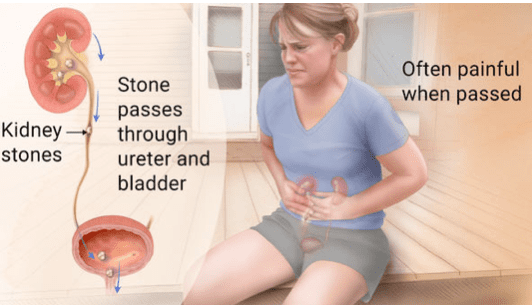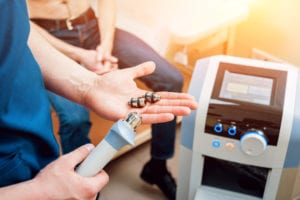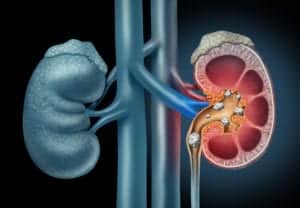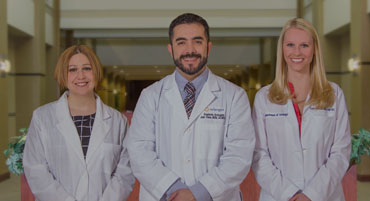Kidney Stones Treatment in Chattanooga, TN
What are kidney stones?
A kidney stone is a solid formation of tiny mineral crystals that can develop in anywhere in the urinary tract, but most commonly in the kidneys. Kidneys filter blood and remove waste products from the body through the urine. When abnormally high levels of these minerals become concentrated they can create a stone.
Everyone can form crystals in their urine, but not everyone goes on to form kidney stones. When these crystals remain small, they can be passed without pain. Also, stones formed in the kidney that do not block the flow of urine usually do not cause symptoms. But if they migrate into the ureters, and block the flow of urine, they may cause pain and blood in the urine. More serious issues associated with kidney stones can arise when a kidney stone blocks urinary flow and causes infection or kidney failure.

What causes kidney stones?
Kidney stones form when your urine contains more crystal-forming substances — such as calcium, oxalate, and uric acid — than the fluid can dilute. The makeup of the person’s urine may not have sufficient substances to prevent crystals from sticking together. This makes it easier for kidney stones to form.
The cause of a kidney stone can often be traced back to the type of stone. For instance, if you a high-protein diet or have gout, that’s the likely cause of uric acid stones. If you’ve had a urinary tract infection, that’s likely behind your struvite stones. Certain dietary factors can cause calcium and oxalate to increase and cause a calcium stone to develop.
What are the symptoms of kidney stones?
A small kidney stone and stones that don’t move may not cause symptoms. But once the stone moves around within your kidney or passes into your ureter (the tube connecting the kidney and bladder), you will know. This can be very painful.
Typical symptoms of kidney stones include:
- Severe abdominal pain, flank or low back pain, groin or testicular pain.
- Pink, red, or brown urine. Blood in the urine can be a common sign of a kidney stone.
- Urinary symptoms such as burning, constantly feeling like you have to urinate without getting much urine out
- Pain when urinating
- Pain that comes in waves and fluctuates in intensity
- Cloudy or foul-smelling urine
- Nausea and vomiting
- Fevers and chills if there is an infection
Who is at risk for kidney stones?
Kidney stones are more common in men than in women. Pregnant women can develop kidney stones. People can develop kidney stones almost at any age including children.
What risk factors contribute to kidney stones?
- Low fluid intake, or strenuous exercise without adequate fluid intake, which results in an excess concentration of these minerals in the urine and form crystals. Fluid refers to water, and not caffeinated beverages, or alcohol.
- Certain medical conditions and prescription drugs.
- Diet, genetics, and climate also influence kidney stone formation.
- In children, diet and genetics are causative. Intake of salty foods, low fluid intake, and sodas and other foods sweetened with high fructose corn syrup put children at risk for kidney stones.
Four Main Types of Kidney Stones
 Calcium stones
Calcium stones
the majority of kidney stones occur in two main forms: calcium oxalate and calcium phosphate. Oxalate stones are most common and are due to an accumulation of calcium oxalate in the urine. Phosphate stones are less common and are due to autoimmune diseases and certain drugs. Both of these stones types can occur together.
Uric Acid stones
Uric acid stones form in acidic urine. Uric acid is a byproduct of the breakdown of animal proteins, making the urine more acidic. Gout, chemotherapy, and other disorders may increase the risk for this type.
Struvite stones
Typically known to be infection stones, these stones are made of magnesium ammonium phosphate and/or calcium carbonate. They result from chronic and recurrent urinary tract infections due to specific types of bacteria.
Staghorn stones
These are stones of any type that grow large and branched, and occupy a large portion of the urinary system. They usually contain bacteria and can destroy the kidney if untreated or cause life-threatening blood infections aka sepsis.
Cysteine stones
These stones are due to an inherited disease called cystinuria. These stones tend to be very hard, which can make treating them difficult with medical and surgical therapy.
How are kidney stones diagnosed?
If your urologist suspects kidney stones, they will ask questions about your medical history including diet, fluid intake, family history, and lifestyle. Additionally, they will order blood and urine tests, ultrasound, abdominal x-rays, and likely a CT scan. Once a stone is identified treatment options will be given to you. You may read more about treatment options here.
Dr. Shridharani is an expert in diagnosing and treating kidney stones. He has performed over a thousand kidney stone procedures and will get you on the right track to prevent the stones from returning with medical therapy. He is a top-rated urologist in the Chattanooga, Tennessee, Alabama and Northern Georgia area. Please contact us with your concerns. We will listen, answer your questions, explain your condition, and provide stellar services to address your specific needs.
Do all kidney stones require removal?
Most small kidney stones don’t require removal. Drinking 2 to 3 quarts of water a day can flush out your urinary system and pass the stone. Over-the-counter pain relievers will help. If necessary, Dr. Shridharani can prescribe an alpha-blocker that relaxes muscles in your ureter to help pass the stone more quickly and with less pain.
Are there non-surgical options for kidney stone treatment?
Many treatment options for stones are available. Symptoms, size of the stone, stone location in the urinary tract and type of stone will determine the type of treatment. If the stone is large, causes untreatable pain or dehydration, blocks the flow of urine, or accompanies an infection a procedure may be necessary.
Pass The Kidney Stones
Most small kidney stones will pass out of your body through the urinary tract, with increased fluid intake and pain medications. To help stones pass without a procedure, medications such as tamsulosin (Flomax) may be given to help passage.
Medical Management of Kidney Stones After Metabolic Evaluation

Because the stone disease may be linked to other health conditions, your urologist will perform a detailed medical and dietary history, test your urine, blood, and obtain imaging studies. For people with complicated stones or recurrent stone formers, a metabolic evaluation consisting of a comprehensive blood and urine tests may be indicated.
The most common recommendation by your urologist will be to increase your water intake, as dehydration is a key risk factor for stone formation. Stones are linked to diet, therefore your urologist will let you know what dietary changes can reduce your risk of forming stones. Medications such as potassium citrate or diuretics may be used depending on the type of stone you form.
Read What Patients Had to Say About Their ExperienceWith Dr. Anand Shridharani!
Dr. Shridhrani takes a personal approach to cure his client and keep you informed of every step in the process!”
“Dr. Shrid was absolutely amazing! Very professional and friendly staff. He had my procedure done in about 15 minutes, and made sure I was comfortable and relaxed. It wasn’t near as bad as I was expecting. Will definitely be referring him to others!”
What procedures are used to remove kidney stones?
Shock Wave Lithotripsy (SWL)
Shock Wave Lithotripsy (SWL) uses high energy sound waves to fragment the stones into small sand-like particles which can then be more easily passed. This is one of the most common treatments for kidney stones. It is best for kidney stones smaller than 2 cm, stones that are not overly dense, and those that can be seen on x-ray. The main attraction of lithotripsy is noninvasive and is performed on an outpatient basis. Furthermore, this procedure may allow you to have stone treatment without a need for a ureteral stent, which can cause some minor discomfort and urinary symptoms. Sometimes you may require more than one lithotripsy to completely treat your stones, the smaller and less dense the stone is the more likely you will need one treatment. This procedure is not recommended for pregnant women, people with bleeding disorders, infections, skeletal abnormalities or morbidly obese.
Ureteroscopy with Laser Lithotripsy
Ureteroscopy with Laser Lithotripsy is an endoscopic option to treat stones located anywhere in the urinary tract. Stones up to 2 cm in diameter may be treated effectively. These stones can be treated with the use of a flexible ureteroscopy or rigid ureteroscope depending on the stone position within the urinary tract. A small miniature fiberoptic camera (ureteroscope) is inserted in the urethra and up into the kidney over a guidewire. A laser is then used to break the stones into small fragments. These fragments are extracted by the ureteroscope with a small basket or flushed out with water. It is an outpatient procedure usually performed under general or spinal anesthesia. Because the ureter swells from the stone and during the surgery, a small stent (hollow tube) may be placed in the kidney to facilitate urine flow postoperatively. The stent is removed at home if strings are left on the stent or subsequently at a follow-up visit. This treatment option also offers the highest success rate to have your stone removed with one procedure.
Percutaneous Nephrolithotripsy
Percutaneous nephrolithotripsy is an endoscopic means of removing large stones. It requires a small, less than 2 cm incision in the back. The stones are broken up with ultrasound or laser treatment. A hollow tube is inserted. The crushed stone is removed through this tube. This procedure is used for large and irregularly shaped stones (usually larger than 1.5cm – about the size of a marble), for people with infections, for people who are not candidates for ureteroscopy and for those whose stones cannot be broken up by extracorporeal shock wave lithotripsy. This requires general anesthesia and highly specialized surgeons.
Robotic Surgery
Robotic Surgery using the da Vinci® Robotic Surgical System is minimally invasive, offers less pain, blood loss, scarring, and faster recovery. It is a specialized form of minimally invasive surgery using a robotic arm, a camera, a 3D imaging processor and remote control. It is very precise and is ideal for delicate urologic surgery. Stones removed by the robot are usually performed in conjunction with another robotic procedure.
Open Surgery
Open surgery is rare and may be needed if other methods fail. Surgery may be required where the stones are damaging kidney tissue, causing recurring urinary tract infections, blocking the flow of urine or are significantly large.
Is Shock Wave Therapy Safe?

Is Ureteroscopy With Laser Lithotripsy Safe?
Often after the laser is used to break up the stone and the fragments are removed by the ureteroscope, a ureteral stent is left in the ureter. This ensures that the kidney drains urine well after surgery. This leads to the main risk of this procedure. About half of patients have what is known as “stent pain.” The stent can rub on the inside of the bladder, causing a feeling of needing to urinate/overactive bladder. The stent can also allow urine to pass up from the bladder to the kidney during urination, causing symptoms from a warm, tingling sensation to intense pain. Also, the procedure can damage the ureter with a perforation. These will usually heal with stenting.
Can Kidney Stones Be Prevented?
It is most beneficial to increase your water intake and make changes in your diet. Drinking lemon juice may be helpful. Studies suggest that a healthy intake of dairy products reduces kidney stone formation, but the use of calcium supplements may increase the risk. A normal calcium diet is suggested. High salt and high sugar diets may be bad for kidney stones. Obesity is related to kidney stones. Sometimes medicines can be used to decrease the risk of developing new stones. If a stone has passed and can be analyzed in a lab, the lab can determine the type of stone so that specific prevention methods can be used.
Dr. Shridharani is an expert in diagnosing and treating kidney stones. He has performed over a thousand kidney stone procedures and will get you on the right track to prevent the stones from returning with medical therapy. He is a top-rated urologist in the Chattanooga, Tennessee, Alabama and Northern Georgia area. Please contact us with your concerns. We will listen, answer your questions, explain your condition and provide stellar services to address your specific needs.
Schedule a Consultation Today!
Dr. Shridharani offers advanced treatment for kidney stones in Chattanooga and Knoxville TN, Northern Georgia, Huntsville AL and the surrounding areas. Call (423) 778-4MEN (4636) to schedule an appointment today!






